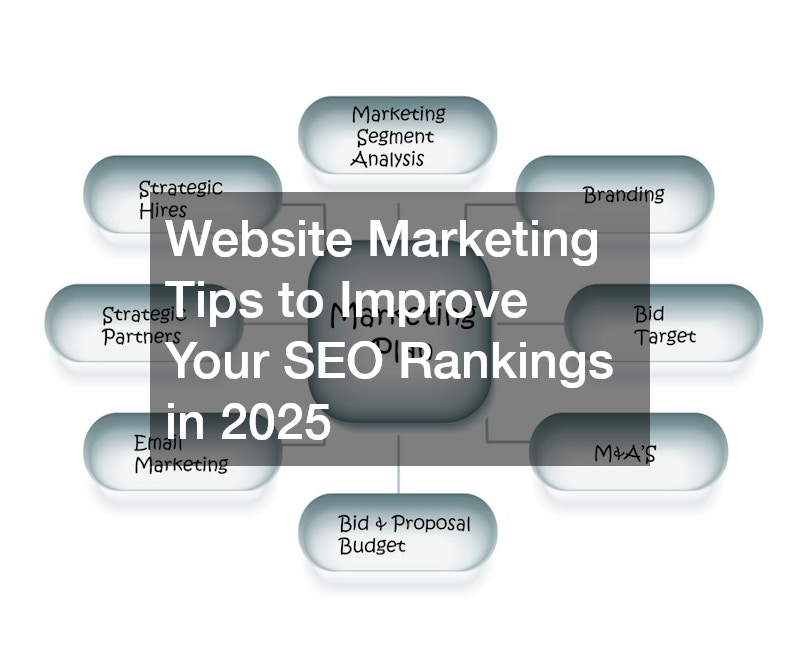Website Marketing Tips to Improve Your SEO Rankings in 2025


In the fast-evolving digital world, business owners and executives are under constant pressure to keep their online presence ahead of the competition. While new platforms and trends continue to emerge, one strategy remains a constant driver of success: effective website marketing. Especially as we head into 2025, your website is more than just an online brochure—it’s your most powerful digital asset.
But to truly leverage its potential, you must go beyond aesthetics and user interface. You need to integrate marketing strategies that align with current SEO trends, AI developments, and shifting user expectations. In this comprehensive guide, we’ll explore website marketing tips specifically designed to improve your SEO rankings in 2025 and help your business stay ahead of the curve.
What Has Changed in SEO in 2025?
Before diving into actionable website marketing tips, it’s important to understand what’s changed. Search engines like Google are constantly refining their algorithms to deliver better, more relevant results to users.
Here’s what you need to keep in mind in 2025:
- AI-driven content analysis: Search engines now assess content quality, context, and user intent more deeply using AI models.
- E-E-A-T focus**: Google rewards content that demonstrates Experience, Expertise, Authoritativeness, and Trustworthiness.
- Voice and visual search growth: More users are searching using voice assistants and image-based queries.
- Core Web Vitals: Page load speed, responsiveness, and visual stability still impact rankings significantly.
- User engagement metrics: Dwell time, bounce rate, and click-through rate influence your SEO performance.
These changes mean you need a multifaceted approach to marketing your website. Let’s dive into strategies that can boost your rankings this year.
How Can You Optimize Website Content for Better Rankings?

Content remains the cornerstone of SEO. But in 2025, creating content isn’t just about filling your blog with keywords. It’s about delivering real value in the most engaging, efficient way possible.
Here are key website marketing tips for optimizing content:
- Start with keyword intent: Focus on long-tail keywords that reflect what users want to do, not just what they’re searching.
- Use semantic SEO: Include related terms and contextually relevant topics that help search engines understand your content depth.
- Update old content: Refresh outdated posts with new data, images, and links to maintain relevance.
- Use AI-assisted content tools: Platforms like Jasper, SurferSEO, and Clearscope help structure and optimize content in line with current search trends.
- Include multimedia: Embed videos, infographics, and interactive elements to improve dwell time and engagement.
- Optimize for featured snippets: Use question-based H2s, short answers, and bullet points to increase chances of being selected as a featured snippet.
Pro Tip: Always align your content with your audience’s pain points and goals. Business executives respond well to data-backed insights and actionable advice.
Why Is Technical SEO Still a Priority?
Even the most engaging content won’t rank if your website’s backend is broken. Technical SEO ensures your site is easy for both users and search engines to navigate.
In 2025, the following technical elements are critical:
- Mobile-first indexing: Your site must perform perfectly on mobile devices, or it won’t rank well.
- Structured data markup: Add schema to your content (product, FAQ, article, etc.) to help Google display rich results.
- SSL certificate: HTTPS is non-negotiable—it’s both a ranking factor and a trust signal.
- Fix crawl errors: Use tools like Google Search Console to identify and repair broken links, redirects, or inaccessible pages.
- URL optimization: Keep URLs clean, descriptive, and keyword-relevant.
- XML sitemap and robots.txt: Ensure these are updated so search engines know how to crawl your site effectively.
Investing in technical SEO not only improves your rankings but also enhances user experience—another important ranking factor.
How Does User Experience (UX) Affect SEO?
User experience is no longer just a web design metric—it directly impacts how Google ranks your pages. If users find your website difficult to navigate or slow to load, they’ll leave quickly, signaling to Google that your site lacks value.
Here’s how to improve UX for better SEO:
- Speed up your website: Use tools like PageSpeed Insights or GTmetrix to identify and resolve bottlenecks.
- Make navigation intuitive: Your site structure should allow users to find information in just a few clicks.
- Optimize your CTAs: Clear, well-placed calls to action improve engagement and reduce bounce rates.
- Use responsive design: Ensure seamless viewing across all devices.
- Enhance visual hierarchy: Use headings, fonts, colors, and spacing strategically to guide users’ attention.
- Limit intrusive elements: Avoid aggressive pop-ups that disrupt user flow.
A fast, easy-to-navigate, visually appealing website not only satisfies users but also signals quality to search engines.
How to Leverage AI for Website Marketing in 2025

AI is revolutionizing SEO and website marketing. In 2025, businesses that intelligently incorporate AI tools will have a distinct competitive advantage.
Here’s how AI can enhance your website marketing efforts:
- AI-generated content outlines: Use platforms like ChatGPT or Gemini to brainstorm blog structures and keyword clusters.
- Predictive SEO: Tools like MarketMuse or BrightEdge forecast high-impact keywords based on user behavior.
- Chatbots for user engagement: Integrate smart chatbots to assist visitors and reduce bounce rates.
- Personalization engines: Deliver content and offers based on visitor behavior and preferences.
- Voice search optimization: Use natural language in content to target voice-based queries.
- AI-based A/B testing: Use machine learning to test and refine landing pages in real-time.
AI empowers you to scale and refine your marketing strategy more efficiently. Use it to stay agile and responsive to evolving trends.
Website Marketing Tips for Better Search Rankings
This section pulls together the most important website marketing tips you need to implement in 2025 if improving SEO is your top priority. These insights are especially curated for decision-makers who want measurable outcomes.
Essential Tips:
- Optimize for voice and visual search: Use natural language queries and structured data for better discoverability in non-text searches.
- Focus on topic clusters: Group content around central topics with internal linking to strengthen topical authority.
- Refresh core pages quarterly: Update your home, services, and high-traffic pages every 3–6 months to stay competitive.
- Improve site architecture: Use silo structures that connect related content logically, making it easier for Google to crawl.
- Implement zero-click content: Give quick answers within your pages so users find what they need without bouncing.
Executive-Level Insights:
- Monitor KPIs weekly: Track metrics like organic traffic, dwell time, SERP rankings, and page speed.
- Develop an SEO culture: Involve your marketing, dev, and content teams in SEO conversations.
- Invest in thought leadership: Publish high-authority articles or whitepapers and link back to your site from industry publications.
- Build ethical backlinks: Partner with trusted industry sites for guest blogging and PR opportunities.
These strategies combine technical execution with long-term brand-building. This is key to sustainable SEO growth.
How Important Are Backlinks in 2025?
Despite ongoing algorithm changes, backlinks remain a vital SEO factor. Google continues to value high-quality, relevant inbound links as a sign of authority and trust.
To build an effective backlink strategy in 2025:
- Earn links through content quality: Create resources that others naturally want to link to (original research, statistics, tools).
- Guest post on reputable websites: Focus on niche-specific publications with high domain authority.
- Leverage digital PR: Publish opinion pieces or expert insights on trending industry topics.
- Use broken link building: Find broken links on high-traffic blogs and offer your content as a replacement.
- Monitor link health: Use tools like Ahrefs or Semrush to identify and disavow toxic backlinks.
Think of backlinks as reputation points. A few high-quality links are far more valuable than dozens of low-quality ones.
Should You Focus on Local SEO in 2025?
Yes, especially if you operate in specific geographic markets. Local SEO helps your business show up in map packs, voice searches, and mobile results.
Local SEO tips:
- Claim and optimize Google Business Profile
- Encourage customers to leave reviews
- Use location-based keywords
- Get listed in local directories
- Add location schema to your site
Even if you’re a national brand, local SEO enhances your visibility in regional search queries and mobile-based searches, which are more common in 2025 than ever before.
Measuring Success: Which SEO KPIs Matter Most?
Understanding what to track is key to improving your strategy. Focus on these metrics:
- Organic traffic: Are more people finding your site via search?
- Bounce rate and dwell time: Are they staying and engaging?
- Conversion rate: Is your SEO traffic driving sales or inquiries?
- Keyword rankings: Are you climbing for target terms?
- Click-through rate (CTR): Are your meta titles and descriptions attracting clicks?
Use tools like Google Analytics 4, Search Console, and third-party platforms like Moz, Ahrefs, or Semrush to measure and refine your campaigns continuously.
Conclusion: Take Action Now to Stay Ahead in 2025
Website marketing and SEO are no longer optional strategies—they are business essentials. As we look ahead in 2025, only those who invest in smart, data-backed website marketing will capture audience attention and climb the rankings.
From optimizing content and leveraging AI to improving technical SEO and backlinks, every element of your site must work together like a well-oiled machine. As a business owner or executive, now is the time to align your digital team and make SEO a core pillar of your marketing strategy.
Implement these website marketing tips today, and watch your SEO rankings—and business performance—soar this year.


